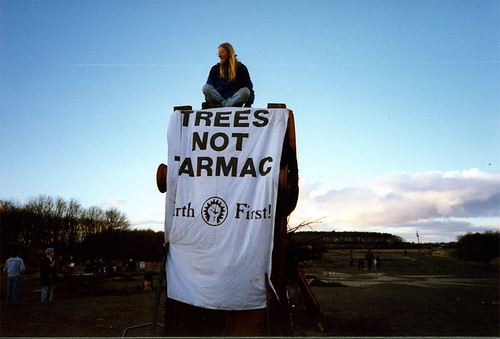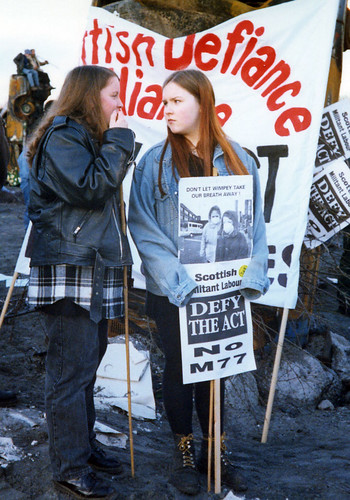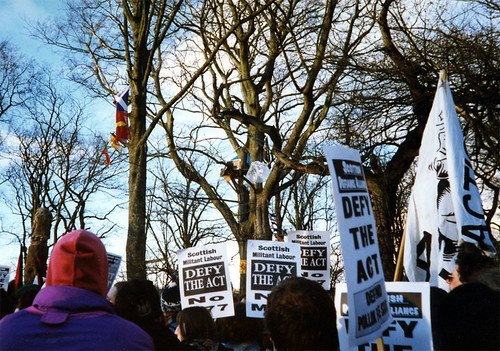Pollok Free State and the M77 Struggle
The news that the government have given the go-ahead to the M74 extension has caused outrage amongst campaigners in Scotland. The proposed road extension in Glasgow has been bitterly opposed for years and campaigners thought they had won when an enquiry recommended against the extension. Now it seems that the Scottish Executive know better and are going to build it anyway. So much for reducing pollution.
The media have been bringing up the last time we saw a conflict like this, which was the building of the M77 motorway through Pollok in Glasgow in the early 90's. A camp was built by anti-motorway protestors and a campaign began to get going against the motorway.
The local community soon got involved and it was then that the campaign became really interesting. Scottish Militant Labour had a strong influence in Pollok, it had been one of the strongest centres of the anti-poll tax campaign of the late 80's-early 90's. It was the home base of Tommy Sheridan who was a well-known figure already. SML also included an important section of local community activists and, crucially, young people.
SML's youth work in Pollok probably deserves a book of its own. It had successfully united rival gangs, who instead of fighting each other had come together and were often involved in political campaigns.
At the same time there was the creation of a local Glasgow branch of Earth First!, a direct action environmentalist organisation. They soon got involved in occupations of council buildings and the anti-m77 camp. Pollok Free State was born. Actually there had been a camp at Pollok since the first indications of a motorway in 1992, when a local man took to the trees armed only with a copy of Robert Burns' poetry. But now it really took off with a number of mad Ewok village tree-houses. It even had its own 'People's Free University of Pollok' which attracted poets and preachers.
So it was an interesting meeting of worlds. The young team in Pollok and the Marxists of SML were meeting with the disparate group of hippies, environmentalists and anarchists in the Pollok Free State.
An unprecedented united front was created which crystalised in the Scottish Defiance Alliance, which came together to oppose the Criminal Justice Act. The SDA became the key organisation in the Pollok Free State.
The SDA was an important predecessor of the SSP. But what kind of organisation was it? Just another front? Here is an amusing account from the time by a Scottish anarchist:
"Of course the appeal of direct action to Scottish Militant Labour has to be understood. There have been examples in history where Communist Party members took part in such actions, and even the SWP at times have to show their 'mettle'. The difference is that Militant now places community struggles at the centre of their strategy, no longer giving it second billing to workplace disputes and confrontation is part of the way people can see through the role of Labourism, as defenders of the status quo. Even as far as 'controlling' actions, a level of sophistication appears to have been adopted. The Alliance Against the Criminal Justice Bill, rechristened the Defiance Alliance is a case in point. Unlike the front organisation character of the Scottish SWP's "Coalition", the Alliance involves ravers, animal libbers, anarchists and - especially Earth First. Such was the structureless nature of the Alliance, the Scottish Federation of Anarchists tried to bring up the formal structure of the organisation at the February Alliance conference."
The important alliance then was between the activists and the community and between activists themselves who ceased to rant at each other and turned their energy to join with the local community against the increasingly heavy-handed actions of the road builders and police.
Here is another account from the time by an Earth-Firster about how the campaign stepped up a notch.
"What happened on Valentine's Day coupled with the involvement of the local Militant group to a great extent changed perceptions and began to increasingly radicalise the nearby communities against the road. At 6 am on Valentine's Day 300 police and security surrounded the camp, placing roadblocks on the surrounding road and cordoning off the area to allow tree cutting at the actual camp. Seven people were resident in the camp that morning and were effectively cut off from the outside world. The network of phone contacts suddenly went dead and plain-clothed officers watched a number of activists' homes.
Word spread about the events at the camp, and the police who were using a local school's playground as a base alerted many of the pupils to the camp's plight. 100 kids walked out of classes, charging down the roadbed, breaking through police lines and saving the bulk of the camp. 26 security resigned that day refusing to be class traitors anymore. One security guard said: "I have a wife and four kids to feed but I'd rather go back on the dole than this." Militant were central in convincing many of the security to quit, knowing many of them from the local area. Wanted posters were to be made up of certain security men's faces who were known to live in the area and were in effect shitting on their own. The security that did not resign have begun to mask up, either because they will be recognised by the brew or their own communities, or to not risk charges when assaulting protesters.
The pupils began to organise their own union, and three schools started to take part in the protests. Bellamine pupils demanded two hours off lessons per day to protest, and when their demands were not met, began to strike...
The No M77 campaign has brought about the long spoken about alliance between Green and Red and made it a reality. Many environmentalists began to see the campaign beyond wholly moral terms and saw the class and social implications of this fight. Militant defending trees would have been unthinkable a few months ago but it's happening, as direct action is being seized by the community as a tool of empowerment"
It was in this environment that activists like Rosie Kane became interested in socialism. The SDA experience led to SML becoming involved in the Scottish Socialist Forum. This organisation of a few Labour Lefts like Allan Green (now SSP General Secretary) in the Scottish Socialist Movement, the Communist Party of Scotland and the left-nationalist journal Liberation soon saw the formation of the Scottish Socialist Alliance. This in turn led to the creation of the SSP after a few years.
With the M74 decision we could see a new chapter in the struggle to defend working class communities against environmental destruction.
:: | 12:14 pm | | ||
0 Comments:
This is an archived story. See current posts here!





